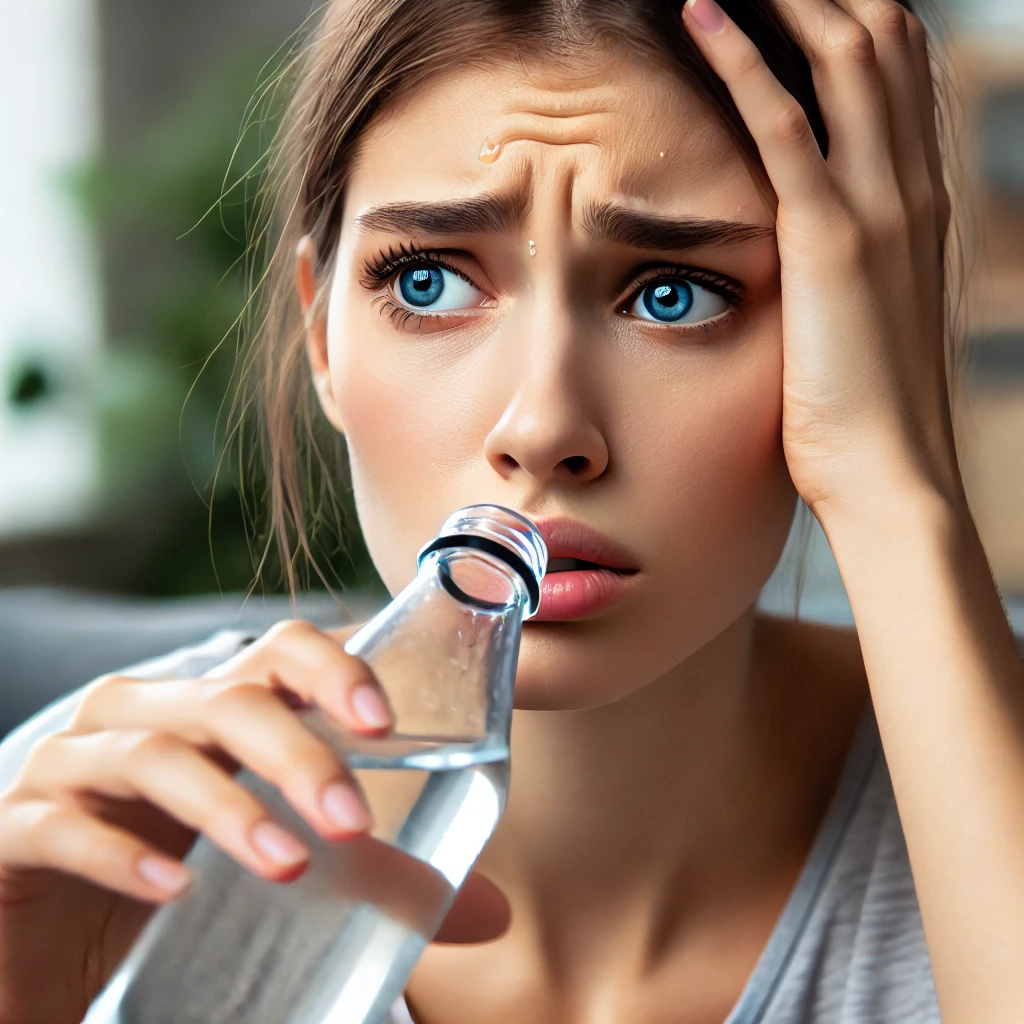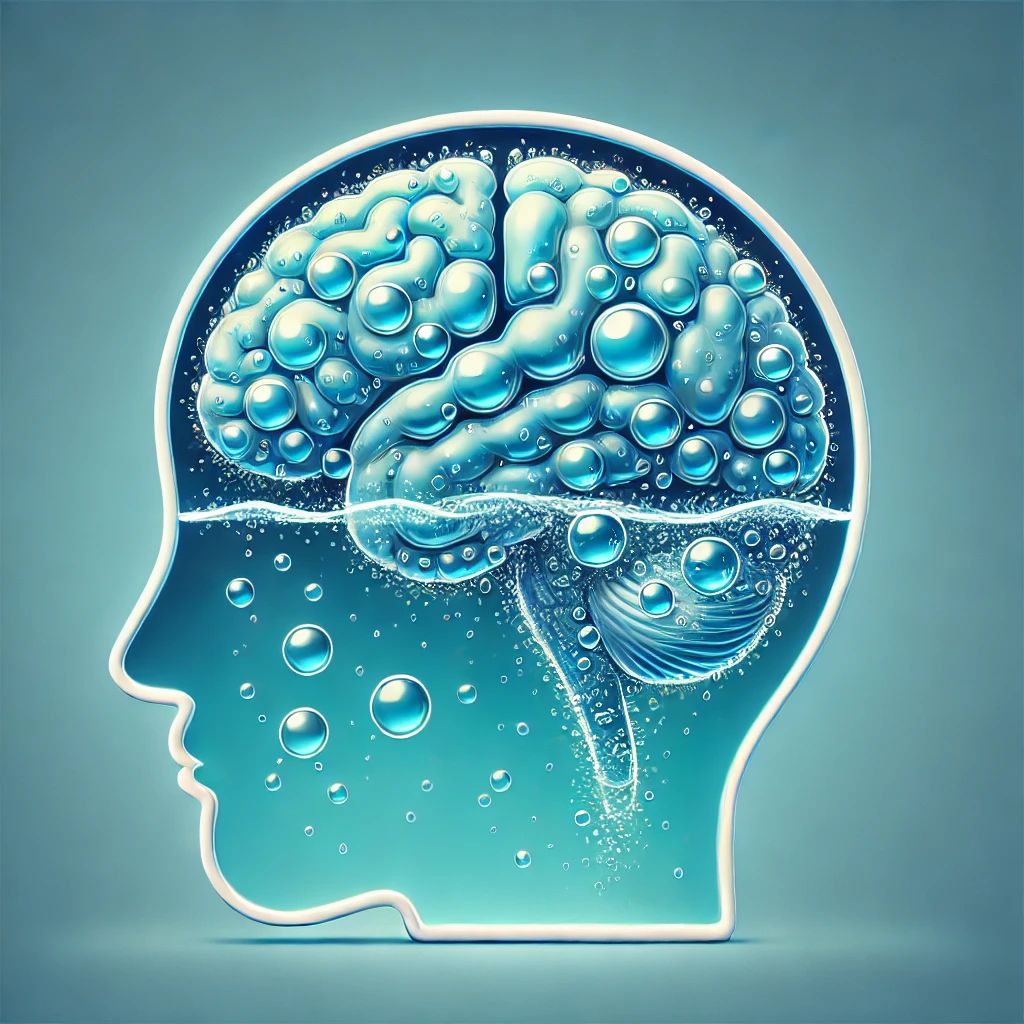Introduction
Anxiety is a mental health disorder that affects millions of persons globe and presents as unease, worry, and concern. When you’ve ever had anxiety, you may have questioned whether something unforeseen, like hunger, was to blame. Obviously, keeping hydrated is advantageous to your physical health, but is there an actual relationship between your water intake and mental wellness? Can emotions of anxiety be enhanced by thirst?
In this blog we will analyze the relationship between anxiety and dehydration, going deeper into the ways in which poor water consumption may be damaging to mental well-being. We’ll look at the most current studies, symptoms, and methods that keeping hydrated may help reduce worry.

What is Anxiety?
There is more to anxiety than merely being tight or anxious. Periodic worry is a normal part of life, but anxiety disorders demand for more than ephemeral dread or concern. These feelings might be powerful, persist longer than normal, and get in the way of ordinary chores.
Common Symptoms of Anxiety:
- Excessive worry
- Restlessness or feeling on edge
- Difficulty concentrating
- Rapid heartbeat
- Sweating or shaking
- Difficulty breathing
- Fatigue
There are various elements that could contribute to anxiety, such as culture, environment, and genetics. But may something as basic as drinking enough water be contributing?
The Role of Hydration in the Body
Water is important for your body to operate. It supports cellular function, controls body temperature, assists in digestion, and even lubricates joints. It’s easy to underestimate the value of keeping hydrated until the harmful consequences of dehydration become evident.
How Dehydration Affects the Body:
- Decreased Cognitive Function: It may be tough to focus, think clearly, or retain information when dehydrated.
- Physical Symptoms: Dizziness, tiredness, and lightheadedness may be indicators of dehydration.
- Mood Changes: Dehydration may aggravate irritability, anxiety, and even despair, which may add to anxieties and concerns.
The Connection Between Dehydration and Mental Health
Your brain is 75% water, so it’s no surprise that dehydration has a significant impact on brain function. When you’re not adequately hydrated, the brain may shrink slightly due to fluid loss, and the result is a slower cognitive process and impaired mental clarity.
The balance of neurotransmitters, such as dopamine and serotonin, which are critical for regulating mood and stress responses, may also be dramatically influenced by dehydration. In the case that these brain chemicals are not synced, anxiety may grow.

How Dehydration Can Trigger or Worsen Anxiety
Water has a direct physiological influence on mental wellbeing. Several biological processes that occur when you’re thirsty may worsen anxiety symptoms:
- Increase in Cortisol (Stress Hormone): The principal stress hormone in your body, cortisol, may elevate in reaction to dehydration. Increased anxiety, wrath, and uneasiness may arise from high cortisol.
- Disruption of Brain Function: Dehydration, even modestly, may lead to diminished blood flow to the brain, which reduces attention and focus. This dizziness may generate worrisome thoughts or increase existing worry.
- Physical Symptoms Mimicking Anxiety: Common indications of dehydration, such as headaches, dizziness, and quick pulse, may mirror symptoms of worry, making the difference between the two problematic.
Symptoms of Anxiety Related to Dehydration
Many symptoms of dehydration correlate with physical worry, which may occasionally lead individuals to mistake the two. Being hydrated and aware of these indicators may help you manage or minimize anxiety:
Physical Symptoms:
- Headaches: Dehydration may restrict blood vessels in the brain, which may worsen headaches and anxiety.
- Dizziness: Being lightheaded is a frequent sign of dehydration and may create worries, especially for individuals who are nervous.
- Rapid Heartbeat: An accelerated heart rate, typically accompanied with panic attacks, occurs from the heart needing to work harder to pump blood when one is thirsty.
Mental Symptoms:
- Irritability: An excessively dry brain may make you more prone to passion and wrath, which may transform into worrisome thoughts very swiftly.
- Difficulty Concentrating: Dehydration inhibits brain function, making it more difficult to focus and concentrate, and may even produce feelings of overburden.
- Confusion: When thirst rises, mental acuity declines, which may induce dizziness or disorientation, especially during moments of stress.
Scientific Studies on Dehydration and Anxiety
Growing research on the influence of dehydration on mental health suggests a substantial association between water and mood control. Let’s review a few notable discoveries:
- Study on Cognitive Performance and Mood: A study published in the Journal of Nutrition found that even mild dehydration led to decreased cognitive performance and increased tension or anxiety in young women.
- Dehydration in Athletes and Anxiety: Another study involving athletes demonstrated that dehydration increases feelings of tension, anxiety, and fatigue, proving that hydration is essential for mental well-being, especially under stress.
- Hydration and Mental Health: Research in the British Journal of Nutrition indicated that people who drank more water reported better moods and less anxiety compared to those who drank less.
The data reveal a clear correlation between stress and water. Although remaining wet won’t eliminate anxiety difficulties, it may aid minimize some of the mental and physiological symptoms that come with stress.
How to Stay Hydrated and Combat Anxiety
So, how can you ensure that dehydration doesn’t contribute to your anxiety? Here are some practical tips:
1. Drink Water Regularly
Carry a water bottle with you at all times, and aim to drink eight 8-ounce glasses (or roughly two liters) of water per day, although your needs may be different.
2. Eat Hydrating Foods
Increase your consumption of foods rich in water, such as leafy greens, oranges, cucumbers, and melons. These meals not only offer you with more water but also contain vitamins and minerals that are healthy for your brain.
3. Limit Caffeine and Alcohol
Due to their diuretic qualities, alcohol and coffee may both promote increased urine output and dehydration. To offset the effects of these drinks, make sure you’re drinking lots of water.
4. Monitor Your Urine Color
Observing the color of your urine is an easy approach to measure your state of hydration. While darker urine could suggest dehydration, bright yellow or clear pee shows great hydration.
5. Set Hydration Reminders
If you regularly forget to drink water, try drinking apps or set alarms to remind you to remain hydrated throughout the day.
When Anxiety Persists, Seek Professional Help
It’s vital to bear in mind that anxiety disorders typically require specialist treatment, even as maintaining hydrated may help control anxiety symptoms. Seek the exact evaluation and treatment choices of a healthcare expert if you are having persistent worry.
Conclusion
Dehydration may surely cause anxiety. Although it may not be the major cause of anxiety disorders, keeping appropriate water is vital for maintaining mental well-being and avoiding needlessly high body stress levels. You may be able to better control your physical and mental health by monitoring how much water you consume.
But, it’s vital to see a healthcare expert for more in-depth treatment if your worry lingers after you’ve slept. When it comes to mental health, water is only one component of the equation, but it’s an important one that’s frequently disregarded.
FAQs
Can drinking more water help reduce anxiety?
Yes, drinking enough water helps ease some physical symptoms of anxiety including headaches, dizziness, and fast pulse, which are also markers of dehydration.
How much water should I drink to prevent dehydration-related anxiety?
Aim for at least 8 cups (2 liters) of water every day, while your requirements may vary depending on activity level, environment, and personal health.
Does dehydration cause panic attacks?
Dehydration may lead to physical symptoms, such as elevated heart rate and dizziness, which may resemble or provoke panic episodes in certain persons.
Are there foods that help with hydration?
Yes, fruits and vegetables with high water content—such as watermelon, cucumbers, and oranges—can enhance your hydration levels.


